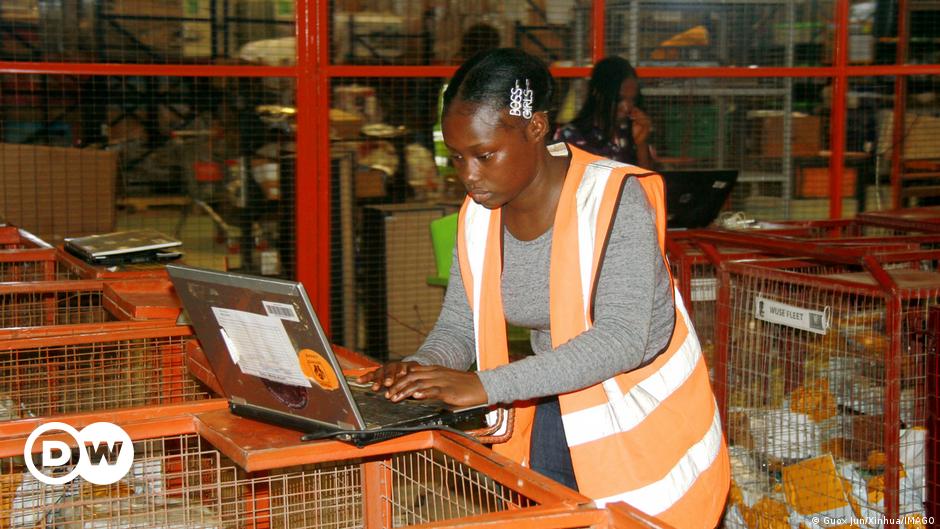Africans are gradually embracing the convenience of online shopping, but the trend is still in its infancy in Africa compared to more established markets such as Asia, Europe and the United States.
By 2025, e-commerce could account for 10% of total retail sales in Africa's largest economies: Nigeria, South Africa and Egypt, according to a forecast by the McKinsey Global Institute.
But experts say that while the e-commerce sector has great potential in Africa, it faces challenges related to cultural and logistical factors – considerations that are crucial when it comes to customising products and services to suit local tastes.
Who are the leading e-commerce companies in Africa?
Africa's largest online marketplace is e-commerce company Jumia, which attracts 23 million monthly visits, followed by online shopping platform Takealot.com, which attracts 10 million monthly visits, 96% of which are from South Africa, where the company is based.
Souq.com, a Middle Eastern company that Amazon acquired in 2017, has about 10 million monthly visitors, mostly from Egypt, while in South Africa, fashion and lifestyle retailer Shein is the most popular shopping app.
Vinod Goel, Jumia's CEO for East Africa, told DW that the online market in Africa is still in its early stages.
“You can also look at what’s happening in markets where e-commerce is very mature, e.g. [in] “China,” Goel said.
“E-commerce is already a big part of these markets – Southeast Asia, India, Europe, the US – and we're going to see the same thing happen in Africa,” he said, adding that the e-commerce industry was entering an “interesting boom period where these barriers are disappearing.”
Listed on the New York Stock Exchange, Jumia draws sales from countries including Nigeria, Egypt, Morocco, Kenya and South Africa.
Attract new shoppers with social media
Internet penetration in Africa is increasing, with the number of internet users expected to reach approximately 570 million by 2022, more than double the number in 2015..
Nigeria, being the most populous country in Africa, has the largest number of users, which is contributing to the rise in online shopping.
Olisa Chukwuma, a DW correspondent based in the Nigerian capital, Lagos, said social media has become a decentralized tool for finding and contacting customers directly through platforms such as Instagram.
“You can appeal to customers with your pictures, you can appeal to customers with the quality of the products you are offering, you can appeal to customers with your pricing so they can actually get in touch with you directly,” he said, adding that the penetration of the internet has been a big driver for this online shopping industry, especially in Nigeria.
Challenges to the growth of online shopping
However, for e-commerce to thrive on the continent, several barriers need to be addressed.
Several Nigerians DW spoke to noted that reliable and efficient delivery service is crucial to customer satisfaction.
“Sometimes a product is advertised, you order it, but what you receive is not worth what you paid,” one Nigerian said.
Another noted that customer service is a widespread problem in Nigeria.
“For some vendors, it is still difficult to manage customers' emotions as long as they have received the money and the customer has paid. Sometimes they don't even answer the phone,” she told DW.
DW correspondent Chukwuma echoed these challenges, adding that being scammed when buying online remains a problem.
“Nigeria is the kind of country where you flood your timeline with condemning comments, you draw the authorities to you and they will get you,” he said.
Amazon enters South Africa
Amazon launched its operations in South Africa in May, with the e-commerce giant entering a sector largely dominated by local e-commerce players such as Take-a-Lot, as well as a number of early-stage online retailers hoping to grow.
Online retailer Paula Maseko said Amazon's presence in South Africa could put small businesses like hers at a disadvantage because “Amazon has more resources than us and will probably charge us lower prices.”
Maseko was optimistic and said his business, like many others, would need to change and adapt to survive.
Contributions by Isaac Kaledzi, Eddy Micah Jr, and Olisa Chukwumah.
Editor: Keith Walker
While you're here: Every weekday we host AfricaLink, a podcast packed with news, politics, culture and more. You can listen to and follow AfricaLink wherever you get your podcasts.


